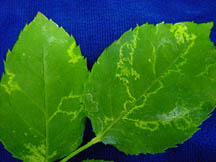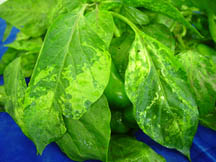Virus Testing at Plant Clinic | |
|---|---|
| May 22, 2007 | |
|
Viruses can cause diseases in herbaceous plants, vegetables, and even in woody plants. They rarely cause damage to plant health in the last group but can be of great concern to those who propagate plants. Roses and ash are the most common woody hosts of concern. Herbaceous plants in greenhouse can have many virus problems, as can annuals, perenniels, and vegetables grown in polyhouses or moved to outdoor production. The symptoms of viruses include some general problems such as poor plant vitality, stunted growth, and reduced leaf size, as well as more specific symptoms such as a mottled or mosaic pattern in the foliage, ringspots, distorted growth, or odd color patterns. Sometimes these symptoms are not visible at first (latent) but become obvious with temperature changes or time. The images show rose and pepper samples with symptoms of virus.   Viral pathogens do not have fruiting bodies or spores to help with identification. They cannot be cultured from infected plant material onto artificial media. They do not cause oozing of material from the infected site. Serological methods are necessary to confirm the presence of a virus in infected plant material. The generally accepted serological methods usually involve ELISA (enzyme-linked immunosorbant serological assays). Molecular diagnostics can also be used, but costs become much higher with molecular testing. The U of I Plant Clinic can test for some viruses but not all possible plant viruses. We have tests for viruses that we see most often in our lab and for which there are detection kits available. At present, we can test for cucumber mosaic virus, impatiens necrotic spot virus, cymbidium mosaic virus, Odontoglossom ringspot virus, potato virus Y, squash mosaic virus, tobacco mosaic virus, and tomato spotted wilt virus. We can make referrals to specialty labs for other virus tests. Additionally, we can order reagents for other virus tests if we know a large sample request for a virus is coming to us. Refer to our Web site, http://plantclinic.cropsci.uiuc.edu/, for information about fees and sample preparation. In most cases, plant material submitted for virus testing must arrive fresh so that sap can be extruded for testing. Fees are required with the testing request. | |
| Author: | Nancy Pataky |
